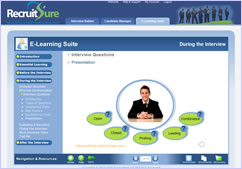Academics can break types of interviewing questioning down into hundreds of different categories and styles but this article will focus on the two main ways of phrasing a question.
Interviewing Questions – 2 Most Common Structures
Essentially there are two main question structures, open or closed.
A closed question will really only allow the respondent to answer yes or no, or perhaps a quantity. For example:
‘Have you passed the Level 3 NVQ for that subject?’
or
‘How many GCSE’s do you have?’
Closed interviewing questions are used to get detailed information and to clarify answers. When you need the respondent to deliver more information and in their own words, then it’s time to turn to open interview questioning.
Open interview questions put the onus on the candidate to formulate and structure the answer in their own words. You learn more about the subject you asked about, but also more about the way the interviewee thinks, processes information, and works under their own initiative.
A classic example of an open interviewing question is:
‘Tell me what you think you can offer this company..’
If the answer to this has the facts you want to hear but is delivered in a stop-start, bumbling way, then you will have discovered a bit more about the candidate’s character, strengths and weaknesses.
This doesn’t mean necessarily that they’re wrong for the job. If they are going to be a programmer then not being able to speak well in stressful situations is unlikely to be a problem, but you might not want to put that person in a call centre.
Knowing Which Interview Questions To Ask and When
Open or closed interviewing questions are neither good nor bad, you just need to use a mix and know which ones to ask at any given time. If an open interview question has delivered a summary of the candidates responsibilities at their current job, but you suspect they were evasive about how much control they had over a certain element, you can drill down with a follow-up closed question like this:
‘So did you have sole responsibility for the marketing budget?‘
It’s at this point you need to watch the eyes and the tone of voice; a solid, clear ‘yes’ is what you’ll be looking for and anything else might warrant more direct questioning to drill down into the issue.
Problems can occur if you ask a closed question when really you want the sort of answer that an open question would have brought out. For example, if you are interviewing for a delivery driver, you would want to know how much driving experience they have. You could ask:
‘Do you have any driving experience?‘
The answer might be a detailed list of all the positions that the interviewee has had where driving has been a significant part of the role. On the other hand, they would be well within their rights to answer ‘yes’ or ‘no’. If that happens, you can hardly mark the candidate down, because they did answer the question.
You could argue, probably quite rightly, that a candidate that answered in that way is either being deliberately obstreperous or isn’t that helpful, and you can draw your own conclusions about whether or not that makes them suitable for the position.
But you might be better off asking:
‘How much driving experience do you have?‘
This is a slightly less closed version and it should get you more of an idea of the breadth of the candidate’s experience. You could follow this up with a more open question like:
‘Tell me more about the type of driving jobs you’ve had.’
Interviewing Questions – 2,000 Interview Questions To Ask
Larger companies will have an HR department to call on to help out when interviewing people but many small and medium companies don’t have this HR expertise. There is a low cost solution however and the RecruitSure online system contains a library of 2,000 interview questions to ask.
Within minutes you can create a professional interview script for a whole range of jobs within your organisation.
|
Barry Poole, Mortgage Broker
Learn More About Recruitsure and How it Makes Interviewing Easy »




